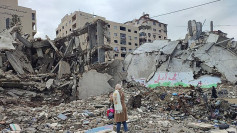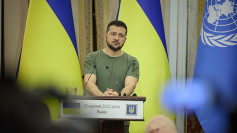Israel plunged into an unprecedented crisis on Monday when the nation's largest trade union, Histadrut, declared a "historic" strike to protest Prime Minister Benjamin Netanyahu's proposed judicial revamp. The strike halted transportation, closed universities, restaurants, retailers, and even embassies, including those in Washington DC, London, and Paris.
Histadrut confirmed that essential services, such as hospitals and firefighters, would follow a Saturday schedule during the strike. Notable closures included Israel's main airport, Ben Gurion Tel Aviv, and the country's largest port in Haifa. Major retailers, such as McDonald's and the Azrieli Group, also shut down.
The strike was declared after Netanyahu fired Defense Minister Yoav Gallant on Sunday, the first cabinet member to demand a pause in the judicial reforms. Spontaneous protests erupted in Tel Aviv, with citizens waving Israeli flags and chanting "democracy." They blocked streets and bridges, including the Ayalon Highway, in a show of defiance.
Although Israeli media reported that Netanyahu would address the situation on Monday, he only issued a tweet urging protesters to "behave responsibly." He wrote, "We are brotherly people."
Opposition to the judicial reforms has been building for months, with hundreds of thousands of Israelis protesting the proposed changes that would grant governing parties greater control over Israel's judiciary. Former Prime Minister Yair Lapid urged Netanyahu to reverse his decision to fire Gallant, accusing the premier of reaching a "new low."
Lapid later released a statement, describing the past 24 hours as "madness," "loss of control," and "loss of direction." He warned that Israel's national security, economy, and foreign relations were at risk.
Numerous officials called for a halt to the judicial reform process, including Israel's President Isaac Herzog, who implored Netanyahu to pause the plans immediately, emphasizing the "deep concern" hovering over the nation.
In a surprising move, more than two dozen mayors from across Israel initiated a hunger strike on Monday. Herzliya Mayor Moshe Fadlon spearheaded the effort, demanding an end to the "huge crisis" and the "disaster that Israel is hurtling towards."
As protests continue, Netanyahu faces mounting pressure from within his own party. Several Likud party members, including Economy Minister Nir Barkat, Culture and Sports Minister Miki Zohar, and Diaspora Affairs and Social Equality Minister Amichai Chikli, have suggested that the prime minister halt the legislation.






